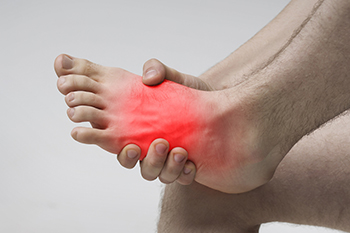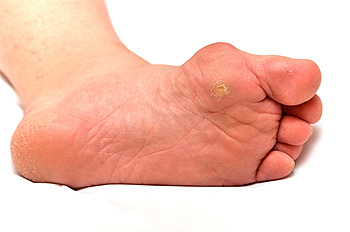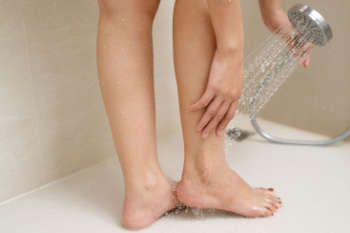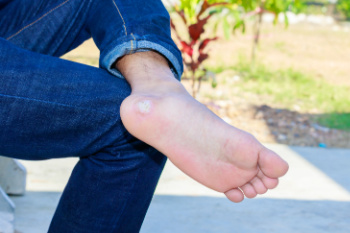6650 Frankford Ave
Philadelphia, PA 19135

Lisfranc dislocation is a complex injury affecting the midfoot, specifically the articulation between the metatarsal and tarsal bones. Commonly caused by trauma such as falls, twists, or direct impact, it is often misdiagnosed due to its rarity and subtle symptoms. High-energy injuries like car accidents or sports collisions are typical culprits. Mismanagement can lead to long-term complications like chronic pain and arthritis. Severity is graded from mild ligament sprains to severe dislocations. Treatment ranges from conservative methods like immobilization to surgical intervention for severe cases, often involving realignment and fixation. If you believe you may have sustained such an injury to your midfoot, it is suggested that you schedule an appointment with a podiatrist for an examination, diagnosis, and treatment.
Foot and ankle trauma is common among athletes and the elderly. If you have concerns that you may have experienced trauma to the foot and ankle, consult with John M. Fanelly, DPM from Northeast Philadelphia. Our doctor will assess your condition and provide you with quality foot and ankle treatment.
Foot and ankle trauma cover a range of injuries all over the foot; common injuries include:
Symptoms
Symptoms of foot and ankle injuries vary depending on the injury, but more common ones include:
Diagnosis
To properly diagnose the exact type of injury, podiatrists will conduct a number of different tests. Some of these include sensation and visual tests, X-rays, and MRIs. Medical and family histories will also be taken into account.
Treatment
Once the injury has been diagnosed, the podiatrist can than offer the best treatment options for you. In less severe cases, rest and keeping pressure off the foot may be all that’s necessary. Orthotics, such as a specially made shoes, or immobilization devices, like splints or casts, may be deemed necessary. Finally, if the injury is severe enough, surgery may be necessary.
If you have any questions, please feel free to contact our office located in Philadelphia, PA . We offer the newest diagnostic and treatment technologies for all your foot care needs.

Common running injuries such as Achilles tendinitis, plantar fasciitis, and stress fractures can sideline runners and hinder training progress. Achilles tendinitis involves inflammation of the Achilles tendon, often caused by overuse, improper footwear, or inadequate stretching. Plantar fasciitis, characterized by heel pain due to inflammation of the plantar fascia, typically arises from excessive running, poor foot mechanics, or inadequate support. Stress fractures, tiny cracks in bones resulting from repetitive impact, often occur in the feet or lower legs due to sudden increases in training intensity or duration. To prevent these injuries, runners should gradually increase mileage, wear appropriate footwear, incorporate strength and flexibility exercises, and listen to their bodies for signs of overtraining. A podiatrist can provide valuable assistance by assessing foot biomechanics and recommending proper footwear or orthotics. Additionally, these types of doctors can prescribe tailored rehabilitation exercises, and offer guidance on training modifications to prevent recurrence and promote optimal foot health for runners. If you have sustained an injury while running, it is suggested that you schedule an appointment with a podiatrist for a proper diagnosis and treatment.
Exercising your feet regularly with the proper foot wear is a great way to prevent injuries. If you have any concerns about your feet, contact John M. Fanelly, DPM of Northeast Philadelphia. Our doctor will treat your foot and ankle needs.
How to Prevent Running Injuries
Many common running injuries are caused by overuse and overtraining. When the back of the kneecap starts wearing out and starts causing pain in your knee, this is commonly referred to as runner’s knee. Runner’s knee is a decrease in strength in your quadriceps and can occur if you’re not wearing properly fitted or supporting shoes. To prevent runner’s knee, focusing on hip strengthening is a good idea, as well as strengthening your quads to keep the kneecaps aligned.
What Are Some Causes of Running Injuries?
- One cause of a common running injury is called iliotibial band syndrome.
- Plantar fasciitis is also another common injury.
- Stress fractures can occur from overtraining, lack of calcium, or even your running style.
Best Ways to Prevent Running Injuries
- Wear footwear that fits properly and suits your running needs.
- Running shoes are the only protective gear that runners have to safeguard them from injury.
- Make a training schedule. Adding strengthening exercises as well as regular stretching can help keep you strong and limber and can lessen the possibility of injuries.
- Stretching keeps muscles limber; this will help you gain better flexibility.
If you have any questions please feel free to contact our office located in Philadelphia, PA . We offer the newest diagnostic and treatment technologies for all your foot and ankle needs.

Corns are thickened areas of skin that develop on the feet in response to pressure or friction. They typically form on the toes or soles of the feet and can be caused by wearing ill-fitting footwear, repetitive motion, or abnormalities in foot structure. Symptoms of corns include pain, tenderness, and the presence of a raised, hardened bump on the skin's surface. Prevention strategies include wearing properly fitting shoes, using protective padding or inserts, and practicing good foot hygiene. Podiatric treatment for corns may involve debridement to remove the thickened skin, trimming to reduce pressure, and recommending cushioning products or custom orthotic devices to redistribute weight and alleviate discomfort. In some cases, addressing underlying foot deformities or gait abnormalities may be necessary to prevent recurrence. If you have a corn on your foot and it is causing you discomfort, it is suggested that you consult a podiatrist for care.
If you have any concerns regarding your feet and ankles, contact John M. Fanelly, DPM of Northeast Philadelphia. Our doctor will treat your foot and ankle needs.
Corns: What Are They? and How Do You Get Rid of Them?
Corns can be described as areas of the skin that have thickened to the point of becoming painful or irritating. They are often layers and layers of the skin that have become dry and rough, and are normally smaller than calluses.
Ways to Prevent Corns
There are many ways to get rid of painful corns such as wearing:
Treating Corns
Treatment of corns involves removing the dead skin that has built up in the specific area of the foot. Consult with Our doctor to determine the best treatment option for your case of corns.
If you have any questions please feel free to contact our office located in Philadelphia, PA . We offer the newest diagnostic and treatment technologies for all your foot and ankle needs.

Maintaining healthy feet is essential for overall well-being. An easy foot care routine combines at-home care with professional guidance from a podiatrist. Start with regular at-home pedicures, soaking feet in warm water with Epsom salts to soften skin, followed by gentle exfoliation and moisturizing to prevent dryness and cracking. Trim toenails straight across to avoid ingrown nails and file them smooth. Seeing a podiatrist is equally important for comprehensive foot health. Regular check-ups with a podiatrist can detect early signs of issues like bunions, corns, or fungal infections. A podiatrist can also provide personalized advice on proper footwear, foot exercises, and preventive measures. If you want to invest time into taking proper care of your feet, it is suggested that you schedule an appointment with a podiatrist for thorough foot maintenance and early intervention for any underlying conditions.
Everyday foot care is very important to prevent infection and other foot ailments. If you need your feet checked, contact John M. Fanelly, DPM from Northeast Philadelphia. Our doctor can provide the care you need to keep you pain-free and on your feet.
Everyday Foot Care
Often, people take care of their bodies, face and hair more so than they do for their feet. But the feet are a very important aspect of our bodies, and one that we should pay more attention to. Without our feet, we would not be able to perform most daily tasks.
It is best to check your feet regularly to make sure there are no new bruises or cuts that you may not have noticed before. For dry feet, moisturizer can easily be a remedy and can be applied as often as necessary to the affected areas. Wearing shoes that fit well can also help you maintain good foot health, as well as making it easier to walk and do daily activities without the stress or pain of ill-fitting shoes, high heels, or even flip flops. Wearing clean socks with closed shoes is important to ensure that sweat and bacteria do not accumulate within the shoe. Clean socks help to prevent Athlete’s foot, fungi problems, bad odors, and can absorb sweat.
If you have any questions please feel free to contact our office located in Philadelphia, PA . We offer the newest diagnostic and treatment technologies for all your foot and ankle needs.

Plantar warts are benign growths caused by the human papillomavirus, or HPV, infecting the outer layer of the skin on the soles of the feet. They often appear as small, rough lesions with tiny black dots, known as wart seeds. These warts thrive in warm, moist environments such as showers, locker rooms, and swimming pools, making them common among barefoot individuals. Unfortunately, there is no singular quick-fix cure for plantar warts, as treatment methods vary and can take time to be effective. Diagnosis typically involves a visual examination by a podiatrist, sometimes supplemented by a biopsy or other tests. It is important to note that plantar warts can be mistaken for other conditions like calluses or corns. Prevention involves keeping feet clean and dry, avoiding walking barefoot in public areas, and wearing protective footwear, especially in communal spaces. If you or your child has a plantar wart, it is suggested that you schedule an appointment with a podiatrist for a proper diagnosis and appropriate treatment.
Plantar warts can be very uncomfortable. If you need your feet checked, contact John M. Fanelly, DPM from Northeast Philadelphia. Our doctor will assist you with all of your foot and ankle needs.
About Plantar Warts
Plantar warts are the result of HPV, or human papillomavirus, getting into open wounds on the feet. They are mostly found on the heels or balls of the feet.
While plantar warts are generally harmless, those experiencing excessive pain or those suffering from diabetes or a compromised immune system require immediate medical care. Plantar warts are easily diagnosed, usually through scraping off a bit of rough skin or by getting a biopsy.
Symptoms
Treatment
To help prevent developing plantar warts, avoid walking barefoot over abrasive surfaces that can cause cuts or wounds for HPV to get into. Avoiding direct contact with other warts, as well as not picking or rubbing existing warts, can help prevent the further spread of plantar warts. However, if you think you have developed plantar warts, speak to your podiatrist. He or she can diagnose the warts on your feet and recommend the appropriate treatment options.
If you have any questions please feel free to contact our office located in Philadelphia, PA . We offer the newest diagnostic and treatment technologies for all your foot and ankle needs.